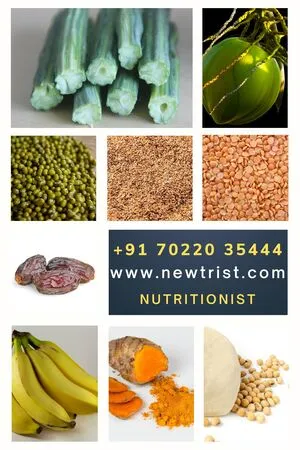Myositis diet plan consists of fruits, vegetables, whole grains, nuts, seeds, lean meats, and dairy products. Foods to avoid for Myositis are refined foods, processed foods, fast foods, sugary foods, sodas, and foods high in salt, saturated fats, and trans fats.
- Early morning drink @ 6:30 am: Coconut water
- Breakfast @ 9 am: Sprouted green moong dal dosa with chutney
- Mid-morning meal @ 11 am: Fruit salad topped with crushed flax seeds
- Lunch @ 1 pm: Brown rice with lentil curry and moringa leaves sabzi
- Evening snack @ 4 pm: Banana-dates milkshake
- Dinner @ 7 pm: Wholewheat roti with soy curry and turmeric milk at bedtime
Consult 19 years experienced Chief Nutritionist Vasanthi for expert advice and a personalized diet plan. In-person consultation at HSR, Koramangala, Bellandur, Haralur, and video consultation across India.
- Consultation INR 750
- 1 Week personalized diet plan INR 2000
- 1 Month personalized diet plan INR 4000
- 3 Months personalized diet plan INR 9000

Table of Contents
What is Myositis?
Myositis is a rare autoimmune condition that is characterized by inflammation, weakness, and aching of the muscles. Some people may face difficulty in standing for a long time and walking for a longer distance. Myositis can the diagnosed with a muscle biopsy and skin biopsy techniques. Abnormalities in the muscle cells and tissues causing inflammation reveal myositis.
A mild physical exercise that doesn’t hurt your muscles and a healthy diet can improve your myositis condition. Myositis recovery can vary from person to person depending upon their health status and immune condition.
Myositis is a short-term condition that waves off within a few days or weeks. In some cases, it may be a chronic condition that if untreated can lead to disability of muscles and muscular atrophy. Stress can overtake myositis condition if uncontrolled. Stress diminishes the immune system and promotes inflammation.
What are the symptoms of Myositis?
Symptoms of myositis are muscle weakness, swelling, fatigue, tiredness, rashes, thickening of the skin in the hands, and difficulty in breathing and swallowing. The person diagnosed with myositis can feel difficulty getting up from a chair/place, and may often fall due to the pain and instability of the body. A mild soreness can be felt that vanishes after a few minutes. A viral infection can accompany myositis due to its weak immune power that can cause symptoms like fever, cold, sore throat, runny nose, and nausea.
The muscle pain may be due to injuries and infections. The muscle pain is mostly around the shoulders, hips, and thighs. Diet and medications can help in relieving the myositis symptoms to some extent.
What are the types of Myositis?
The different types of Myositis are
- Polymyositis
- Dermatomyositis
- Inclusion body myositis
- Autoimmune Necrotizing Myopathy
What is Polymyositis?
Polymyositis is a rare condition where multiple muscles from hips, thighs, and shoulders are affected at the same time. Polymyositis can cause difficulty in lifting heavy objects, climbing stairs, getting up from a place, and walking long distances. Women are more prone to develop polymyositis between the age of 30-60.
What is Dermatomyositis?
Dermatomyositis is characterized by skin problems like rashes in addition to muscle weakness. A red or purple rash may appear on the facial parts like the nose, cheeks, and eyelids, and some other body parts like the upper chest, back, knees, and elbows.
Some may notice rapid changes while others develop this condition gradually. Dermatomyositis can be severe and lead to some skin cancers if not treated in the early stages.
What is Inclusion Body Myositis (IBM)?
Inclusion Body Myositis (IBM) affects men more than women. This type of myositis develops gradually over 10-15 years over the age of 50. The arms and legs are the most affected areas of IBM.
The build-up of protein is accompanied by muscle weakness in Inclusion Body Myositis. Steroids and other medications aren’t effective against inclusion body myositis, whereas, regular exercises and physiotherapy can lend a helping hand.
What is Autoimmune Necrotizing Myopathy?
Autoimmune necrotizing myopathy is a condition where the cells present in the muscles die rapidly causing severe muscle weakness that makes the patient struggle to walk. This is a newly discovered type of myositis in recent times that causes necrosis.
Myositis Diet Plan
Myositis diet plan should consist of healthy foods like fruits, vegetables, whole grains, nuts, seeds, and lean meats. Variations in the diet and control of portion sizes are some of the effective ways to manage myositis. the omega-3 fatty acids in nuts, eggs, and fish possess anti-inflammatory properties that help reduce inflammation and muscle weakness.
No specific diet can be a cure for myositis, but the right selection of foods can make you feel better. The main aim is to prevent nutritional deficiencies, dehydration, and weight loss.
- Early morning drink @ 6:30 am: Turmeric tea
- Breakfast @ 9 am: Wholegrain paneer sandwich with a small guava
- Mid-morning meal @ 11 am: Chia seeds pudding with coconut milk
- Lunch @ 1 pm: Quinoa pulav with cucumber raita and roasted egg
- Evening snack @ 4 pm: Ashwagandha tea with boiled sweet potato
- Dinner @ 7 pm: Sabudhana khichdi with peas, carrots, and beans

Are fruits and vegetables good for Myositis?
Fruits and vegetables are good sources of vitamins, minerals, fiber, and antioxidants. Intake of fruits and vegetables fights inflammation and helps to fight against free radicals. Consume fruits as a whole to avail the fiber content instead of juicing them to prevent the rise in blood sugar levels. Limit the intake of dried fruits as well.
What are the effects of whole grains on Myositis?
Whole grains like brown rice, oats, quinoa, whole wheat products, barley, millets, and unpolished lentils are good sources of fiber and energy. Whole grains are low in fat and a rich source of folate, B vitamins, and zinc that help you to reverse the symptoms of myositis.
Are nuts and seeds good for Myositis?
Nuts and seeds are high in proteins, fiber, and healthy fats. Limit the intake of salty and sodium-rich foods that can increase your inflammation and other problems of myositis. Unsalted nuts and seeds are good sources of selenium and vitamin D. nuts like almonds, walnuts, cashews, and peanuts, and seeds like pumpkin seeds, sunflower seeds, and melon seeds are good for myositis.
What kind of lean meats are good for Myositis?
Lean meats like eggs, skinless chicken, turkey, and fish are good for myositis. avoid deep frying of lean meats and choose grilling, baking, roasting, or broiling. The protein intake for myositis patients depends upon their weight and activity levels.
How do dairy products affect Myositis?
Dairy products are rich sources of protein, calcium, zinc, vitamin B, vitamin D, and selenium. These nutrients improve muscle inflammation and promote immunity. Those who are lactose-intolerant can opt for almond milk/soy milk as a protein source.
Foods to avoid for Myositis
Foods to avoid for myositis include processed foods, refined foods, sugary and salty foods, packaged foods, foods prepared with artificial colorings and preservatives, and sodas.
- Limit the intake of foods made with refined flour and sugars.
- Reduce the consumption of saturated fats and trans fats, instead choose healthy fats found in fish, avocados, and nuts.
- Substitute olive oil and seeds oil for refined oils.
- Avoid fast foods and sugary products made with high fructose syrups and flavors.
Best vegetables for Myositis
The best vegetables for Myositis are
- Leafy greens like spinach and kale
- Broccoli
- Sweet potatoes
- Carrots
- Tomatoes
- Bell peppers
- Green beans
- Beetroots
- Mushrooms
- Cauliflower
- Cabbage
- Radishes
- Pumpkin
- Corn
- Peas

Vegetables are rich in fiber, vitamins, and antioxidants that help to fight inflammation. The presence of B vitamins in vegetables aids in muscle growth and recovery. Vitamin B6 and B12 support protein metabolism and increase the production of red blood cells and improve the immune system. Cruciferous vegetables and calcium-rich vegetables reduce inflammation and help in the faster healing of muscles.
Best fruits for Myositis
The best fruits for Myositis are
- Apples
- Bananas
- Strawberries
- Avocados
- Watermelon
- Oranges
- Guava
- Pear
- Pomegranate
- Grapes
- Melons
- Blueberries
Fruits are excellent sources of antioxidants and flavonoids that help with muscle weakness and improve immunity. The vitamins and minerals present in fruits help in improving muscle weakness and cramps. Vitamins also increase the production of testosterone, a hormone essential for the building and maintenance of muscles.
Tips for Myositis
Tips for myositis are
- Eat plenty of healthy foods that help with muscle pain and weakness.
- Avoid saturated fats, junk foods, fried foods, foods high in sugars and salts, preserved foods, and sodas that trigger inflammation and myositis symptoms.
- Get adequate rest and sleep to allow the body to regenerate new cells and prepare for recovery.
- Get yourself into exercises and physiotherapy. Aerobic exercises restore your stamina and improve muscle strength. Avoid vigorous exercises that can injure your muscles.
- Watch your skin for any allergies or rashes. Take good care of your skin to get rid of any problems.
- Choose foods that help you with recovery from myositis and repair muscle tissues.
- Stay hydrated with more fluids and water which helps in the regulation of blood pressure and heartbeat. Water carries oxygen and nutrients to the cells and tissues which help in healthy muscle repair.
Foods to prevent Myositis
Foods to prevent Myositis require the intake of healthy foods like fresh fruits, vegetables, whole grains, nuts, seeds, dairy products, and lean meats. These foods are rich in fiber, carbohydrates, proteins, healthy fats, vitamins, and minerals that improve stamina and decrease muscle weakness and pain.
Healthier fats like omega-3 fatty acids found in fish, nuts, olive oil, and avocados help to fight muscle inflammation and reduce the side effects of medications.
A balanced and nutritious diet can help to prevent myositis and other inflammatory disorders. Patients with dry mouth experience swallowing difficulties. In such conditions, vegetables can be cooked soft and pureed into soups, stews, and smoothies. Nuts and seeds can be soaked and added to smoothies to avoid nutritional deficiencies.
Chickpeas are a great source of protein that can be taken in the form of hummus. Dairy products like milk and curd can be added to cereals which makes them easy to tolerate. Use seasonings like turmeric, ginger, and cinnamon that are rich in antioxidants to reduce inflammation.
FAQ
Is Myositis curable?
Myositis cannot be cured completely but it can be controlled with the help of a healthy nutritious diet, exercise, physiotherapy, anti-inflammatory medications, and immunosuppressive treatments. These factors can improve muscle performance and help in repairing the body’s muscles.
What are the best foods to eat for Myositis?
The best foods to eat for Myositis are fruits, vegetables, whole grains, lean meats, eggs, dairy products, beans, legumes, nuts, and seeds. A few people may experience swallowing difficulties and heartburn for which soft cooked foods, moist foods, blended soups, smoothies, and juices are advised.
What is the natural remedy for Myositis?
The natural remedy for myositis is the intake of foods rich in omega-3 fatty acids that are found in fatty fish like salmon, sardines, mackerel, herring, anchovies, nuts, seeds, avocados, and olive oil. These foods help in reducing inflammation which is the major problem of myositis. Foods rich in antioxidants like fruits and vegetables can relieve pain and improve the condition.
How can I reduce Myositis?
Myositis can be reduced with the help of a healthy diet, physical exercises, physiotherapies, and some medications. Some doctors prescribe steroids that can cause side effects and can be taken in low doses. Cutting down the intake of processed foods and foods high in sugar and salt content can be beneficial.
Are proteins, vitamins, and calcium good for Myositis?
Protein intake helps in muscle repair, eases soreness of muscles, and promotes speedy recovery. Vitamins B6, B12, D, folate, and calcium are vital nutrients needed for muscle growth and recovery. B vitamins help to reduce pain and inflammation and support healthy nerve functions.
What are the first signs of Myositis?
The first signs of myositis are weak and pain in the muscles that worsens with time. Some people experience difficulty in getting up from a chair, frequent falling, and feeling too tired after a walk. Inflammation, soreness, fatigue, and difficulty in swallowing food can be observed in myositis.
Is Myositis a serious condition?
Myositis can take a long time to progress. Severe myositis can lead to swallowing and breathing problems, and immobility which can make them wheelchair-bound in old age. The muscles get weaker and more painful as the condition progresses which can make them tired while standing or walking.
How can I treat Myositis at home?
Yes, you can treat myositis at home with some remedies. A mixture of turmeric and water paste can be applied over the affected areas to get some relief. Herbs like ashwagandha and ginger can be taken in the form of drinks to get rid of muscle pain. A healthy diet with mild yoga aasanas can help with the condition.
How to reverse Myositis?
Myositis cannot be reversed back to its original form but some improvement can be noticed over months. Dietary modifications and lifestyle changes can help in reducing fatigue and improving stamina which can manage myositis. Healthy diets and heat therapies can reduce inflammation and severity of the disease.